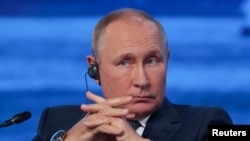On Monday, September 5, Russian President Putin approved a 31-page ''humanitarian policy'' which it said should help "protect, safeguard and advance the traditions and ideals of the Russian World."
The policy statement made clear Putin's intention to "protect" Russian speakers and ethnic Russians wherever they live. It made clear the view that Moscow was entitled to cross borders to provide this "protection" wherever the Kremlin felt it was needed.
Declan Galvin at Nairobi-based risk advisory firm, WS Insight told VOA that the Kremlin is attempting to remake a geopolitical map for their own interests.
''This policy paper is not coming out at a coincidental point in time. This is something that Russia has already clearly asserted as a matter of foreign and security policy through its invasion in Ukraine. But it's also a really important talking point as it goes around its allied countries like in central Asia and on international stages including the United Nations'', he said.
He added that ''They (Russia) are trying to find alternative allies not just to restore its credibility, but they need more markets for petrol products which are no longer being purchased by Europe.
European analyst Rafael Loss told VOA from Brussels that the policy is Russia's way of consolidating support amid sanctions piled by the United States, the European Union and some of its allies following its unprovoked invasion of Ukraine - now in its 6th month.
Loss, however, said what is happening in parts of Ukraine contrasts with Russia's announced resolve to ''defend'' its people.
''In Mariupol, with a predominant Russian speaking population, for instance, the city was decimated. Roughly 1/3 of the population was displaced and another third was killed. There're few people still living there with no public infrastructure, and most housing have been destroyed by Russian artillery and airstrikes'', he said.
Loss added ''So, if this is the idea of protecting Russian speakers and Russians abroad, then this is something that might not necessarily be attractive to Russian speakers that live outside of Russia.''
A number of Western analysts have focused on the Baltic states of Lithuania, Estonia, and Latvia in light of Putin's policy assertion. These former members of the Soviet Union have Russian ethnics and speakers among their populations, and there are concerns that this declaration is Moscow's preface for crossing borders into the Baltics under the guise of "protecting" Russians.
Analyst Galvin adds that Russia is operating under a delusion if it believes its global image has been ''strengthened'' by this policy declaration and the invasion of Ukraine under the guise of "protecting Eastern Ukraine's Russian-speakers.
"The conduct of Russia this year actually diminishes perceptions of its genuine commitment to democracy, and probably more importantly on the global level - diminishes any confidence that it would have interest in promoting democratic principles abroad.''




